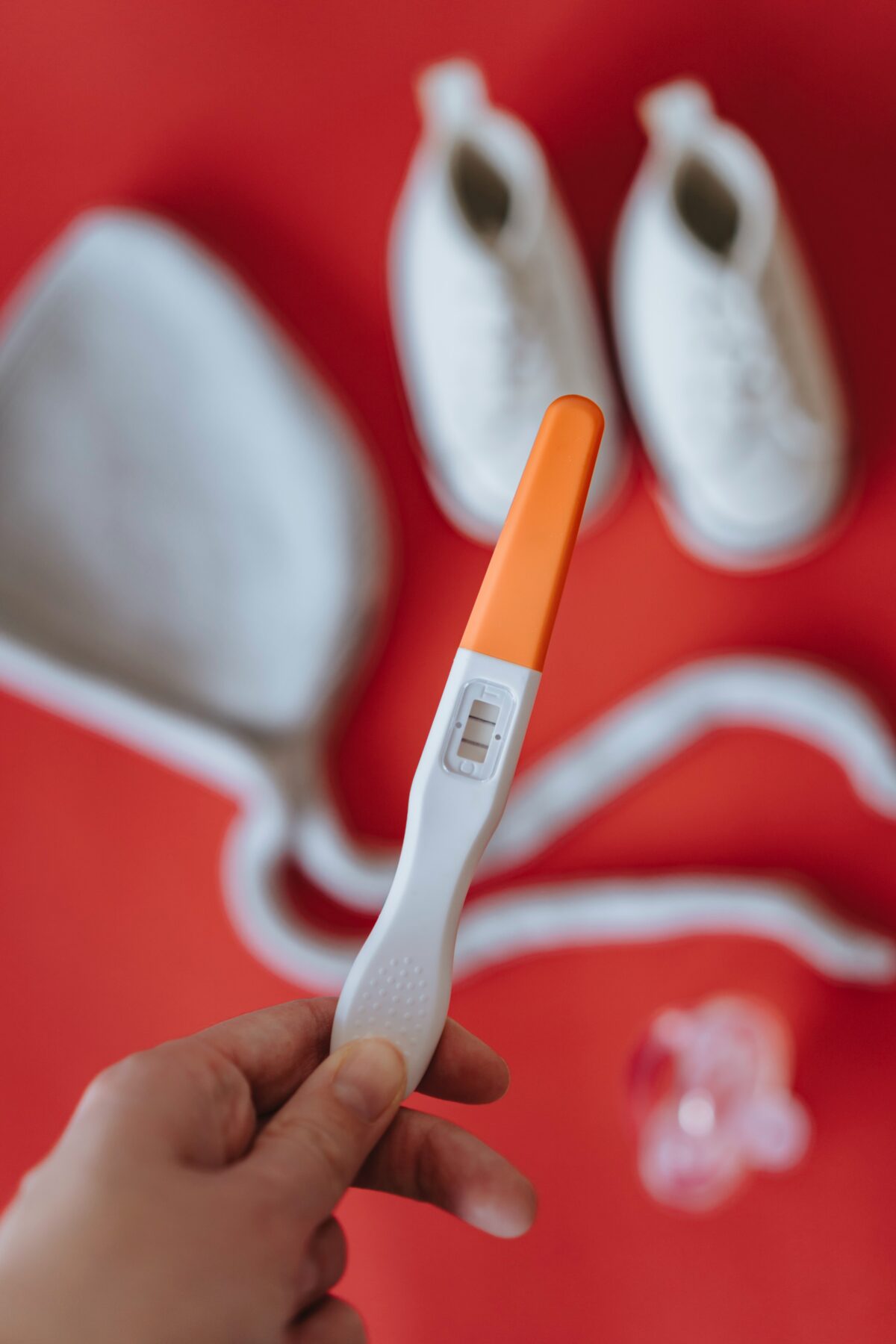Pregnancy Tests: How They Work and When to Take One

You’ve noticed some changes in your body over the past week. Maybe your breasts have felt swollen or tender, you are tired all the time, and maybe you even have spotting (light bleeding that’s not from your period).
Or, maybe you don’t have any symptoms at all, and your period is simply late. Either way, it’s natural to wonder, “am I pregnant?”
It’s time like these when you reach for a pregnancy test. Read on to learn more about how pregnancy tests work, the different types of pregnancy tests, and how to use them effectively.
What is a Pregnancy Test?
A pregnancy test is a tool that can measure the amount of Human Chorionic Gonadotropin (hCG) in your body. hCG, commonly called the “pregnancy hormone,” is produced by the placenta (an organ that develops during pregnancy to provide oxygen and nutrients to the baby). hCG is the hormone that stops your body from menstruating and thickens the uterine lining for a growing embryo.
Your body will start to produce hCG shortly after a fertilized egg implants in your uterus. Your hCG levels build up gradually over the first twelve weeks of pregnancy. This is why you can’t detect a pregnancy immediately after conception.
Different Types of Pregnancy Tests
There are two ways to test for pregnancy: blood tests and urine tests. Let’s cover each now.
Blood Tests
You must see your doctor to get a blood pregnancy test. Typically, your doctor or a pathologist will use a small needle to draw a sample of your blood. They will then send this blood to a lab to test hCG.
There are two forms of blood pregnancy tests:
- Qualitative hCG tests. These simply check for the presence of hCG in your blood. They can tell you whether or not you are pregnant.
- Quantitative hCG tests (or “beta hCG” tests). These measure the amount of hCG in your blood. Quantitative hCG tests can tell you the exact age of your fetus. Doctors also use these tests when diagnosing ectopic pregnancies (a pregnancy where the fertilized egg implants outside the uterus) and tracking potential problems with a pregnancy.
Results from blood pregnancy tests are not instant. You may need to wait up to a week for results.
Urine Tests
Urine pregnancy kits (also called “home pregnancy tests” or “UPT tests”) are available from drug stores, supermarkets, gas stations, and retail outlets that sell medications and personal care products. These tests are Over-The-Counter (OTC), meaning you do not need to consult a doctor or advanced care provider to access them. Some doctors also use urine tests.
To use these tests, you will need to remove the test from the package, expose it to urine, and wait. There are several forms of urine pregnancy kits, including:
- Test sticks that you dip into your urine mid-stream (so 2-3 seconds after you begin urinating)
- Test sticks that you dip into a cup of urine (the cup is usually provided in the test kit)
- Test sticks that require you to collect urine in a cup and use a dropper to place it on the test stick
How Quickly Pregnancy Tests Work
Pregnancy tests take five to fifteen minutes to work.
If you receive a positive result (no matter how faint the line) or believe the result is not accurate, you should consult your doctor for a more sensitive test that can confirm if you are pregnant or not.
How Do Pregnancy Tests Work?
Urine pregnancy kits require you to expose the sample pad of the test to your urine mid-stream. The sample pad of the test contains antibodies with an enzyme attached to them.
Excess antibodies bind to immobilized antibodies, and this causes the control line to appear on the pregnancy test. The control line will show up first. If there is hCG in your urine, immobilized antibodies will bind to it and cause the second line on the pregnancy test to become visible.
The control line shows that the test is working. The second line tells you whether or not you are pregnant. If you see two lines (even if the second one is very faint), you are pregnant.
Some tests do not use the line system. The mechanism for these is the same, except they will show a “-” or “+” or say “pregnant” or “not pregnant.”
How Accurate are Pregnancy Tests?
Both blood and urine pregnancy tests are up to 99% accurate when used correctly.
The accuracy of your blood pregnancy test depends on when you take it and how your provider handles and stores it.
The accuracy of your urine pregnancy test depends on:
- How carefully you followed the instructions
- Whether or not the test has expired
- When you took the pregnancy test
- How diluted your urine was (if your urine is too diluted, the pregnancy test can’t detect hCG)
To ensure your test is accurate, wash your hands before taking the test and avoid contaminating the test stick and equipment. Common household items like detergent have been known to cause false results.
Never use a damaged or broken pregnancy test.
If you have recently given birth or experienced a miscarriage, you may get a false-positive result from both blood and urine pregnancy tests. It takes several weeks for your hCG levels to drop, so consult your doctor or advanced care provider if you believe you are pregnant during this time.
How Soon Can You Take a Pregnancy Test?
hCG levels start to rise in your body between 6 — 10 days after the fertilized egg implants in your uterus. Most of the time, a urine pregnancy test can detect a pregnancy 10 days after fertilization (though keep in mind that fertilization does not occur immediately after sexual intercourse).
To get the most accurate result possible, take a pregnancy test after the first day of your missed period. This will ensure there is a detectable level of hCG in your urine.
Some very sensitive pregnancy tests can detect hCG before you miss your period. However, if you do take one of these early tests, consider re-doing the test if you miss your period to confirm the results.
When to take a pregnancy test
You should take a pregnancy test if:
- You have missed your period
- You have nausea, cramps, sore breasts, food aversions, exhaustion, or are urinating frequently
- Your contraception failed
- You have reason to believe you may be pregnant
Ideally, you should take the pregnancy test first thing in the morning. As you have likely not urinated in several hours, your urine will be more concentrated, and it will be easier for the test to detect hCG.
However, that’s not to say that pregnancy tests taken at other times of the day are not accurate. The test is likely to work as long as your urine is concentrated.
Can a UTI Medication Affect Pregnancy Test Results?
Urinary Tract Infections (UTIs) are infections in your urinary system, including in your urethra, bladder, ureters, or kidneys. UTIs themselves do not usually affect pregnancy test results, but there are two situations where they can.
Situation 1.
If you are taking antibiotics to treat your UTI, the antibiotics will change your urine’s composition. This may dilute your urine and make it difficult for pregnancy tests to detect hCG.
Consult your doctor if you are treating a UTI with antibiotics and believe you are pregnant.
Situation 2.
Frequent urination is a common symptom of UTIs. Some people with UTIs also drink more water than usual to try and “flush out” the UTI. In either case, hCG can sometimes go undetected in diluted urine, causing a false negative result.
If your urine is too diluted for a pregnancy test, try taking a test first thing in the morning. Or ask your doctor for a blood test.
Can Fertility Drugs Affect Pregnancy Test Results?
Some medications used during In Vitro Fertilization (IVF) and Intrauterine Insemination (IUI) can affect pregnancy test results.
Clomid (clomiphene citrate), for example, can cause a false positive because it contains synthetic hCG. A five-day course of Clomid alongside a trigger shot of Novarel, Ovidel, or Pregnyl is often given to women to induce ovulation.
It takes 10 days or so for the hCG in Clomid to leave your blood and urine. So, if you took a pregnancy test during this period, the test would detect the Clomid and return a positive result. Wait at least two weeks after taking Clomid to do a home pregnancy test.
Human Menopausal Gonadotropin (hMG), another injectable IVF or IUI drug, can also cause false positives. hMG medications like Menopur, Repronex, and Pergonal contain two hormones: Follicle-Stimulating Hormone (FSH) and Luteinizing Hormone (LH). LH is structurally similar to hCG, so pregnancy tests can often confuse the two.
What Happens Next?
If your test is positive, make an appointment with your doctor to get a blood test to confirm your pregnancy and discuss your next steps.
If your test is negative and you took the test after you missed your period, you are unlikely to be pregnant. Urine pregnancy tests are highly accurate when performed correctly.
If you have done multiple urine pregnancy kits and gotten mixed results, consult your doctor.
And if you have taken a pregnancy test and do not believe the results are accurate, repeat the test or consult your doctor. In case you have not missed your period yet, you may be pregnant, but your hCG levels may be too low to detect.
Sources:
- https://www.plannedparenthood.org/learn/pregnancy/pregnancy-tests
- https://my.clevelandclinic.org/health/articles/9703-pregnancy-tests
- https://www.healthline.com/health/pregnancy/five-signs-to-take-pregnancy-test
- https://www.webmd.com/baby/guide/pregnancy-tests
- https://www.parentalquestions.com/can-a-uti-affect-a-pregnancy-test/
- https://www.verywellfamily.com/can-my-medicine-effect-my-pregnancy-test-results-2759855




